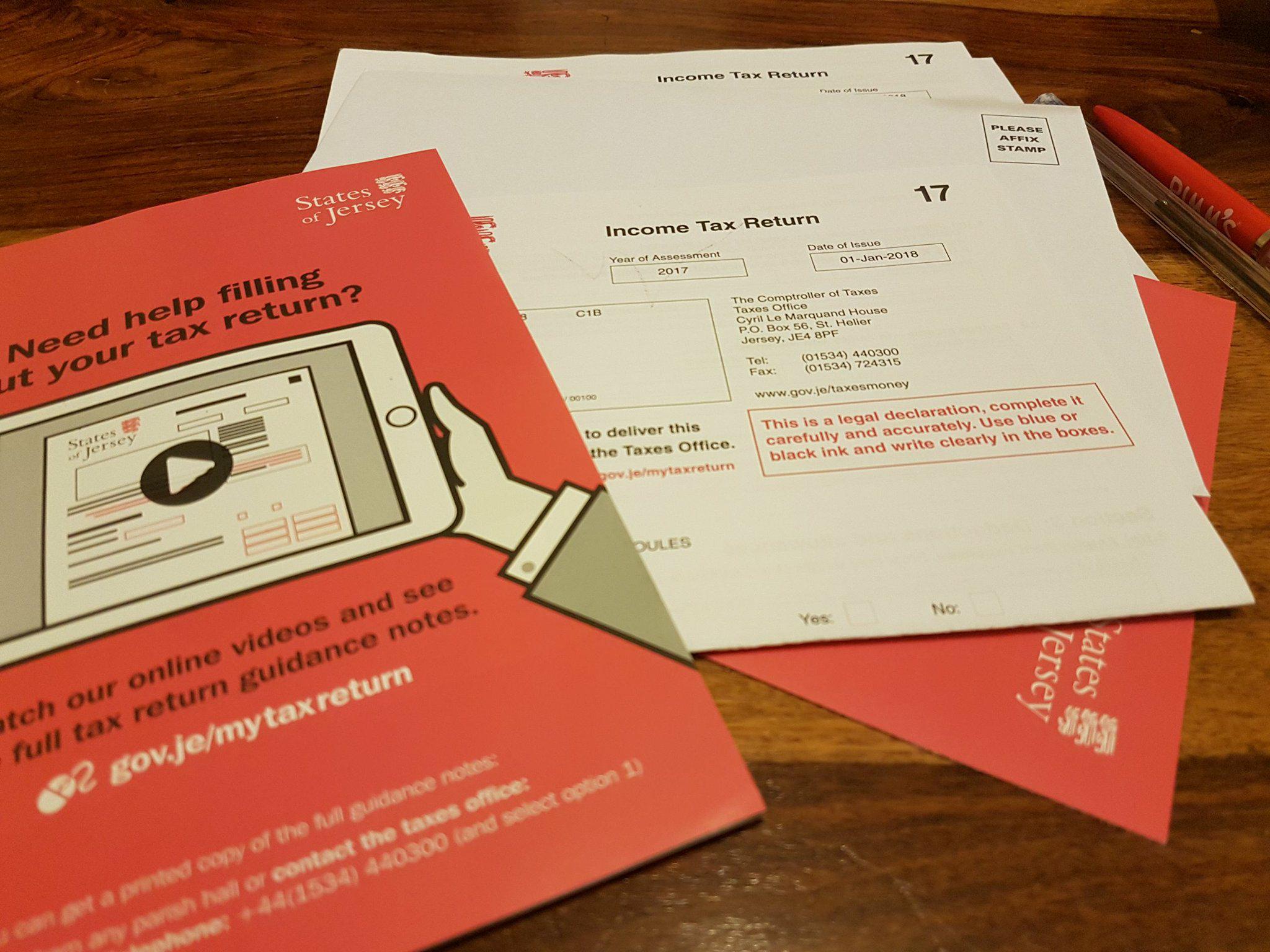

In any discussion about life in Jersey, it’s not long before the subject of ‘tax’ comes to the party.
Whether it is the continual tax haven/not a tax haven debate, a comparison of how much we pay here compared to friends or family in the UK, or simply an irritation that married women don’t have separate tax forms; or that unlike other European counties, we have to manually copy out largely the same financial details on paper tax forms year-on-year…and then wait a few months for the result.
As ever in Jersey, we have had lots of ‘reviews’ of the above issues, but apparently, little actual change.
But now it seems there is some movement. The plan is to create ‘Revenue Jersey’, bringing together the collection of direct and indirect taxes, as well as social security contributions under one roof.
Express spoke to Richard Summersgill, Jersey’s Comptroller of Taxes, about how the way we pay both personal and business taxes is going to change...
Richard Summersgill: "It’s partly about efficiency and it is also about improved customer service. You will have heard the phrase ‘once and done’ and the States has been doing a lot of activities to make it easier for customers to tell the States things once, and then for it to be done. A great many people are at the moment, for example, talking to both the Taxes Office and Social Security about their income. This will enable them to tell us about their income once, and we will assess both their taxes and their social security contributions at the same time, from the same information.
"Already in Jersey law, the Comptroller of Taxes and the Comptroller of Social Security can share a lot of data relatively easily to make it easier for customers, and also to help tackle fraud and wrong doing. So, we already have a good legislative base which enables us to work collaboratively; but we are opening more legal gateways in our new Revenue Administration Law so that we can share information more broadly across the States, where there is a good reason to do that, and a lot of that is about improving customer service. t’s also about being able to detect fraud and error in the system.
"The new Revenue Administration Law is going to introduce penalties, a wider range of civil penalties, to make it easier to correct people’s behaviours where they are getting things wrong, where they fail to file, where they fail to pay.
"We will, for the first time, be able to charge interest on tax debts, which will, we hope, significantly improve levels of compliance with debt management."

Pictured: Changes within the taxes office should bring in digital tax returns.
Express: How difficult has that been, to bring all of that together?
Richard Summersgill: "We are on a journey with it. We have some good legislation. The new laws that we are introducing this year, and the laws that have been introduced in previous budgets, have made it much easier to share information. So, for example, over the last two years we have improved our ability to share information with the Police for the purposes of tackling crime, and that has made working with the Police a lot easier to do.
"People are giving us information for tax purposes, where it is reasonable to do it and legal to do it, we will share that with other departments. Where people are going to the new helpdesk that will bring together all of the States’ services, they will find it easier to talk to one person about a wider range of issues."
Express: Does that enable digital tax returns?
Richard Summersgill: "Yes. It makes it a lot easier to operate in a digital environment; once we introduce the ability to file tax returns online that will significantly improve customer service. People will be able to file their return at any time of day or night. They will almost immediately know what their tax assessment is, and what their effective rate of taxation is."

Pictured: The Taxes Office is currently operating with a 35-year-old system.
Express: How far away is that?
Richard Summersgill: "We are introducing our new revenue management system, the basic computer programmes and systems, around Christmas 2018, this year. We are then going to be running it in the Taxes office for a full year before we start the online services. So, the online services and, in particular, filing for personal taxpayers will come into play in January 2020."
Express: And is that an opportunity to tidy up other aspects of the law which frustrate people, like husbands and wives not having individual tax returns?
Richard Summersgill: "Yes, it is. Having the new computer systems is really a pre-requisite to making other changes. We are running with a 35-year-old system which isn’t capable of doing a lot of things you would be able to do with a new system. Once that new computer system is in, we can then offer Ministers options which they have talked about doing for a long time.
"Minsters of the States have debated changes to the personal tax system for a number of years and we currently have a review of the personal tax system going on which started in 2016; we made the first report in 2017, and the next phase of the review will actually look at that very issue of how, in the future, we tax people and whether the current way we tax married people is right, going forward."

Pictured: Cyril le Marquand House, where the Taxes Office is based.
Express: What implication does that have on the workload of the Taxes Office?
Richard Summersgill: "Well, this is a very big challenge. At the moment, the Taxes Office processes are very manual, and heavily paper-based. We work a lot with paper, it is laborious and time-consuming, particularly with a very old computer system, where our staff can’t even work with a mouse, for example. The new system will completely modernise the way we work, and the loss of paper and all of the processing that goes with that will actually release a lot of our people to do different types of work in the future.
"So, one of the things I expect to happen is that a few of our staff who have been doing fairly mundane processing work, we will be retraining them to do what I think is more exciting and interesting work, dealing more with taxpayers, helping taxpayers to get things right, helping them understand the tax system, and also finding and tackling people who are actively cheating the tax system."
Express: Will you be able to avoid the ‘spikes’ where a lot of people come in at the last minute?
Richard Summersgill: "Even when one goes to a digital system, one tends to find that people file at the 11th hour and the 59th minute. For example, when the Inland Revenue, back in the 1990s, started to go digital and have online filing, they found that their computer servers actually crashed on the deadline date. That’s one thing we are obviously alive to, and will continue all of the efforts that we engage in now, to encourage people to file early - but we will also have to take steps to make sure that our systems can cope with peak demand. I am afraid it is still a basic aspect of human nature that most people leave doing their taxes as long as possible."

Pictured: The Taxes Office's new system should help reduce personal tax evasion.
Express: Is reducing personal tax evasion one of the objectives, and what are the others?
Richard Summersgill: "Yes. One of the questions that the Members of the States Assembly ask is whether Jersey has a tax gap, which is basically the difference between what the law requires to be taxed and what people actually pay. I am quite certain that in Jersey there is a tax gap.
"You know, there are people who get things wrong, and perfectly innocently don’t declare the right amount of tax; and we do find instances of people who deliberately omit streams of income from their tax return. So, one of the things we want to do over the next few years, reinforced by new penalties that we are introducing in the new Revenue Administration Law, is to start to find where people are getting their taxes wrong and get more people fully compliant with the system; and if we can do that, of course, then more money comes into the States for public services. And it is just basically fairness that we make sure that everyone is complying with their tax obligations."
Express: And will they be asked to pay tax in more areas?
Richard Summersgill: "There are no plans at the moment. Ministers every year in the Budget are constantly faced with the question, do we need to raise more revenue and if we do, how should we do it? So, every year, the Treasury Minister is considering a range of budget measures, if those are needed, to increase taxation. So, one of the most recent changes, for example, was the introduction of the taxation of the profits of large corporate retailers, that was one of the latest measures introduced."

Pictured: "Revenue Jersey will be a much more modern and efficient tax administration," says Mr Summersgill.
Express: What changes to business taxation should we be looking out for in the next year?
Richard Summersgill: "I don’t think Ministers are envisaging significant change to business taxation at the present time. Ministers have made it very clear that the Zero/10 policy is working, and we have no plans to review that. Following further discussions with the EU Code of Conduct Group, back in 2017, Ministers did agree to review the need for substance tests to make sure that businesses operating in Jersey were properly operating in Jersey.
"A great deal of work has been going on over the last few months between the Treasury and other departments of the States on that. We are just consulting now on various proposals which we think meet the concerns of the Code Group and also fit well with the operating environment of businesses in Jersey."
Express: How do you see the tax system changing over the next few years?
Richard Summersgill: I think over the next few years, what people can expect to see is that the new concept of Revenue Jersey will be a much more modern and efficient tax administration, operating across a broader range of services and that people will be able to engage much more with the tax system electronically and digitally. We are not proposing to make that 100% mandatory, we do want to provide routes and channels for people who do not want to engage digitally still to be able to access services face-to-face, and manually.
This article originally appeared in Connect. Read it in full here.
Comments
Comments on this story express the views of the commentator only, not Bailiwick Publishing. We are unable to guarantee the accuracy of any of those comments.